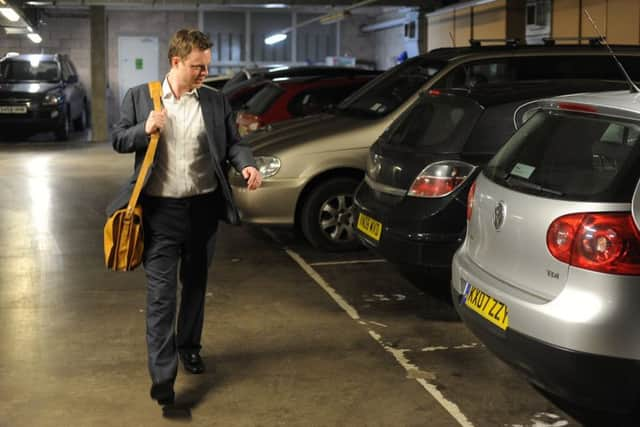Edinburgh council leader: Parking tax ‘should be paid for by employees’
and live on Freeview channel 276
A charge of around £400 a year is expected to be introduced on employers who provide parking spaces for their staff once legislation allowing the move is passed in the Scottish Parliament. It will be up to the businesses to decided whether they foot the bill or hand it on to their workers.
But Cllr McVey said it would be a “lost opportunity” if companies and organisations simply absorbed the cost.
Advertisement
Hide AdAdvertisement
Hide AdHe hopes if Edinburgh does bring in a levy it will lead to fewer people driving to work, less congestion and pollution and more space for people to walk and cycle.


He said: “The hope is by charging no more than couple of pounds a day we are asking people to really think about their journey.”
Edinburgh has been pressing for a workplace parking levy (WPL) for some time, but the proposal to give councils the power to introduce such a charge has sparked a major controversy since it was announced as part of the SNP’s deal with the Greens over the Scottish Government budget.
Tories have complained the plan to allow the levy by amending the Transport Bill currently going through Holyrood means there has been no time for consultation - though the committee looking at the bill now plans to take evidence on the proposal.
Advertisement
Hide AdAdvertisement
Hide AdBut Cllr McVey pledged a full public consultation before a levy is introduced in Edinburgh on how it should work here.


“The nature of this as a discretionary tax means the onus would be on the local councils that want to implement the policy to consult on things like exemptions, how it’s applied and the charging level. The detail is not going to be set nationally, it will be set locally.”
He said although there had been discussion of a parking levy, the council had not explored the details of how it should operate.
But he suggested a levy was likely to apply to the whole city rather than just the centre. “On the Low Emission Zone, we are looking to be quite bold and cover as much of the city as we can - that gives us a platform to jump from. I don’t imagine out thinking on a WPL would be very different.”
Advertisement
Hide AdAdvertisement
Hide AdThe Scottish Government has already said hospitals and NHS premises will be exempt from the charge. The Tories have been arguing teachers should not have to pay either.
And Finance Secretary Derek Mackay told MSPs yesterday: “I do happen to think there’s case for further exemption.”
Cllr McVey said he was open to looking at the options. “We need to understand all the issues at play and respond to them,” he said. “I think there will be exemptions to make it make sense. Hospitals are obvious, but there are others - teachers have already been mentioned. I think we need to look at it.”
Cllr McVey said a levy, if passed on to staff, was likely to be around £1 or £2 a day - much cheaper than the pay and display parking charges in the city centre, which are up to £4.20 an hour in George Street.
Advertisement
Hide AdAdvertisement
Hide Ad“Businesses in the city could see it as a charge on a parking space or a way to engage with their workforce to encourage active travel and public transport as a way of getting in.
“Some companies may not pass it on and just accept it. I think that would be a big lost opportunity for them.
“Many businesses have invested in showers and changing facilities for staff who want to cycle and have a transport plan to promote alternatives to car use.
“It would be disappointing if companies saw it as a minor charge without thinking too much. The point is to get businesses to engage on the issue.”
Advertisement
Hide AdAdvertisement
Hide AdHe said the purpose of the levy was to improve air quality and give people a better quality of life.
“If it makes inroads into the number of private cars coming into the city and bus times speed up as a result and congestion is significantly reduced because of that, I think the vast majority of people will appreciate the enhanced reliability of their services,
“The vast majority of people in Edinburgh walk, cycle or take the bus or train. Only one in four or five say the private car is their primary mode of transport.”
But he added: “I think it will be popular even among those who are paying it.
Advertisement
Hide AdAdvertisement
Hide AdIt is expected the money raised from a levy would be ring-fenced for transport projects. Nottingham, the only city in the UK to operate a WPL, used some of its revenue to extend the city’s tramline.
Cllr McVey said: “It makes sense to use the money to invest in policies which encourage walking, cycling and public transport, encouraging people to make the right choice for the benefit of the city.”
He said it was not expected any of the revenue would be needed for the tram extension to Newhaven because that was to be financed from future fares and a contribution from Lothian Buses.
But he said: “There is a potential tram extension to Granton, which we have not done much work on except for safeguarding the route. I don’t know whether that would be self-financing or not.”
Advertisement
Hide AdAdvertisement
Hide AdIt is not clear how soon a levy is likely to be introduced. Even once the Transport Bill is passed at Holyrood, the council will have to draw up a detailed scheme and carry out the consultation. Cllr McVey hopes, if not in force, it could be all be ready to go before the end of the administration’s term of office in 2022.